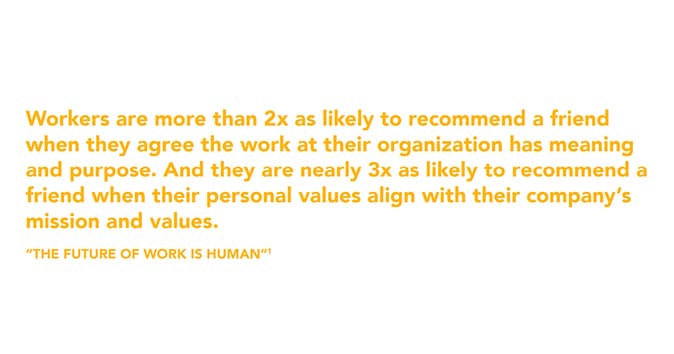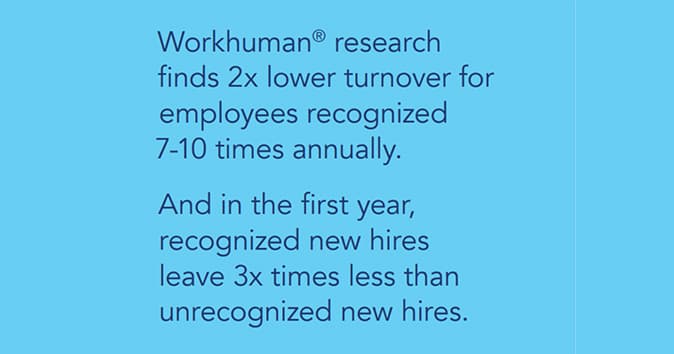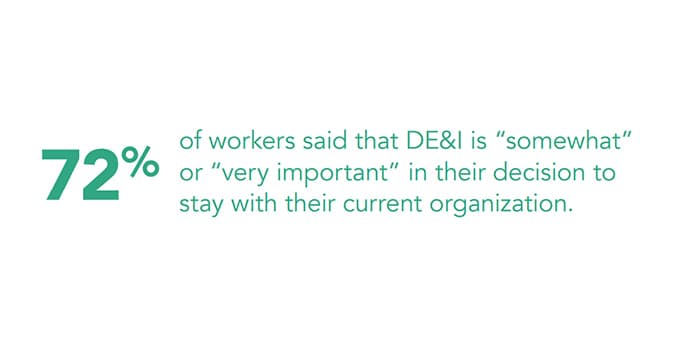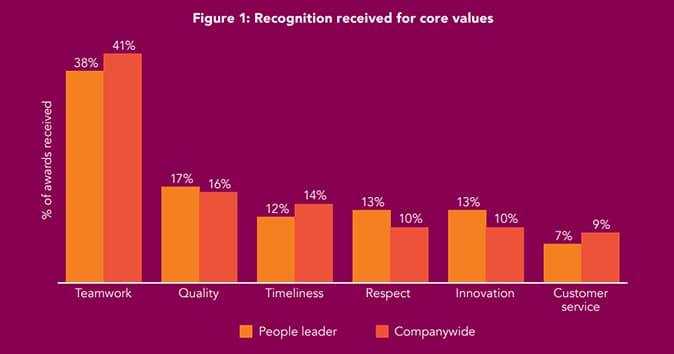23 Core Company Values Examples to Guide and Shape Your Organization

For your organization to thrive in today's fast-paced business environment, you need a strong set of values – something that serves as your North Star when it comes to how you run things.
Seem obvious?
Often, values are easily left behind (or not established in the first place). It's all too easy to get lost in the day-to-day responsibilities of work and lose sight of what's most important to your organization.
Enter company values.
A company's core values are incredibly important in establishing a human workplace. They're what make your organization "tick" and are what inspire both your employees and your customers. Let's look at some company values examples to drive this point home.
What are company values?
Company values are the principles and moral standards that the company upholds, like a compass that points the team in the right direction.
Company values statistics
The core company values serve as a guide to the actions of the team members and add meaning to their work. Company culture is rooted in these principles, which greatly influence business operations for both customers and employees.
So, how exactly does work culture affect employee satisfaction? Let's take a look at some of the figures discovered by a 2019 study of the American job market.
- 76% of employees agree that clear-cut company goals and values promote a healthy work culture.
- 88% of employees believe that work culture is a determiner of professional or corporate success.
- 38% of the working population in the US is drawn to companies whose values and interests align with theirs.
- 35% are willing to skip a job offer if they don't resonate with the company's values.
Sadly, a Gallup study has shown that only 23% of survey respondents claim that their company values are fitting or practical.
That being said, it's not enough to write up these principles. Rather, executives and employees alike will benefit more if they take ownership and enact the company's core values in their workplace environment.

Why are an organization's values important?
Most organizations have a mission statement. It might hang on a wall in the corporate office lobby, near the HR department, or as a screensaver background. It may even come with a set of values intended to help employees sync their behaviors and work habits. But do they?
Employees with a sense of meaning and purpose – whose personal values align with company values – are more than 4x as likely to love their jobs. Therefore, it's crucial to articulate those values clearly and demonstrate how they can come to life at your organization.
Plus, happier employees and a better employee experience are good for your bottom line.
According to a 2015 study of over 700 participants from the University of Warwick, happiness increased productivity by an average of 12% and reached as high as 20% above the control group.
Do your core values truly reflect who you are?
Core values represent an organization's highest priorities, deeply held beliefs, and fundamental driving forces.
They're your guiding principles – who you are, what you believe, and who you want to be – and serve as promises about how your organization will treat customers, employees, vendors, and community members. In short, they're the DNA of your culture.
Retain and attract the right employees

Building a truly human work culture becomes particularly important when recruiting and retaining millennial talent – a vital challenge as financial service organizations struggle to bridge their skills gap.
HR Financial Services states,
“Retaining employees is of vital importance in an industry where, according to a PwC report, only 10% of millennials plan to work for the long-term… Financial service organizations need to be employing a variety of employee retention strategies to hang on to their best employees.”
Findings from the Workhuman® Analytics & Research Institute and IBM Smarter Workforce Institute suggest how to engage and retain valued employees: "Financial services sector employees who experience a sense of belonging, purpose, achievement, happiness, and vigor perform at higher levels and are more likely to report they contribute 'above and beyond' expectations. They are also less likely to quit."
Check out The Financial Impact of a Positive Employee Experience to explore more insights from this study.
"Employees with more positive experiences at work are much more likely to report significantly higher levels of discretionary effort (96% compared to 55%)."
Company values determine the climate in the workplace. It's a factor that drives good employees to leave or stay Opens in a new tab .
How do you define the core values of a company?
Company values can be defined in clear list of principles. These principles can take the form of a short but impactful phrase, an elaborate sentence, or a single word. They should clearly define your company's mission and exert a positive influence over how you do business.
Defining company values starts with your vision statement, where you define who you are as a company, what you want to provide to your employees and customers, and how you want to achieve it. Once these things are clear, your core values will become apparent.
Characteristics of well-defined company values
Here are the attributes of well-structured core company values:
Practical and relatable
Choose company values that every team member can relate to and apply to their work. Otherwise, they could look meaningless on the board.
Keep in mind that writing down seemingly noble values without adhering to them is pointless. If, for example, your company value is to "strive for greatness," but you don't enforce a culture of respect, then maybe you're better off picking another phrase.
While it's okay to be ambitious – beneficial, even – a core value becomes more significant if it's relatable and realistic.
Aligned with your vision statement
When you're in the process of crafting your core principles, be sure to refer to your company's vision statement.
Therefore, it's safe to say that the company vision needs to be well-defined first, as it will be the basis for the values. In essence, the company values support the realization of the vision.
For example, if you see your company becoming the most trusted brand in the world, then "integrity" and "transparency" would be complementary values for that vision.
Comprehensive
It's better to craft core values that relate to each other than trying to conjoin disparate ideas. This helps them be more logical and, thus, easier to remember.
With a comprehensive set of core values, your employees will find it easy to determine their next steps. This is because they understand the company's goals and work accordingly.
How to write company values
Coming up with your organization's core values isn't easy. But core values matter, so it's important to craft values that resonate with the goals and mission of what your company wants to achieve. To get you started, here are some tips on setting core company values:
Discover and nurture what really matters
Successful values are not arbitrarily selected. The best core values need to come from your culture and feed back into it. According to LinkedIn, "86% of millennials would take a pay cut to work at a company whose values they feel are in tune with their own."
Stand out – but don't try to be too clever
Your values should be unique in the same way your company is unique. Be honest. If your style is irreverent and witty, your values should be too.
If your company is more formal, let your values reflect that. Pick three to seven values and make them memorable and distinctive. A litmus test? Your employees should be able to recite them quickly and easily.
Drill down to the specifics
Broad values such as "integrity" or "innovation" can be so vague that they have no real meaning. In such instances, amplify and clarify the meaning of these phrases with taglines or descriptions.
For instance, one of the values at Workhuman is "Respect for Quality." While certainly a cherished value in and of itself, its meaning further comes to life when amplified by its descriptor: "Making good and timely decisions that keep the organization moving forward."
Assign action to each value
When your values are too abstract, it makes it almost impossible for your employees to practice them. Instead, promote values that can be brought to life with specific behaviors.
For instance, in the case of another one of Workhuman's values, "Respect for All," an employee can manifest this value by inviting quiet and introverted people into the conversation during meetings – making them feel comfortable and empowered to share their ideas.
Company values challenge us to innovate and improve because that's where growth is.
Check out these two statements and ask yourself which one would motivate you and your teammates better:
- Strive for greatness every day.
- Do one thing slightly better today.
Both statements could pass for a core company value, except the second one is more actionable.
Make them unique but easy to remember
There's nothing wrong with using generic core values as long as they're relevant to your organization and company vision. However, it hits differently if they have an element that's unique to your business.
They'll somehow give the members a sense of ownership and pride over your company values. So, there's a good chance that there'll be less need for reminders.
Update accordingly
Cultural change comes with growth; it's inevitable. The people, the market, technology – nothing will be the same in the next few years.
So, adapt and update your corporate values when and how you see fit. At some point, you'll find this change to be necessary, and that's totally fine.

23 company core values examples
Crafting your organization's values is a meticulous process. But don't worry. We're here with 23 company core value examples to get the creative juices flowing.
Keep in mind, though, that these are just starting points. Each value you choose should be followed by a descriptor so that they're more specific.
1. Integrity
Integrity is all about trust and morals. Having integrity fuels how you do business, run a team, and treat other people.
Integrity is the basis for many other common company values, like honesty, transparency, and respect.
Workplace integrity is crucial for doing quality work, making big decisions, performing at the highest caliber, and reducing errors.
2. Innovation
Fostering innovation can lead to groundbreaking solutions and a competitive edge in your industry.
You may define innovation as a new and original creation or idea. To come up with an innovation, you must possess the necessary skills or talents, such as creativity and resourcefulness.
Being innovative may also refer to working smart. Over the years, it's found to be more effective than simply working hard, as it doesn't always equate to concrete results.
3. Diversity
In increasingly globalized workplaces, diversity has become one of the most common and significant core values that respect, appreciate, and celebrate the differences between employees.
Be it age, gender, race, ethnicity, nationality, religion, sexual orientation, or physical ability, focusing on diversity ensures every employee feels respected and appreciated in the workplace.
Apart from access to a greater talent pool, more perspectives, greater innovation, and happier employees, a company culture that focuses on diversity also adds to customer experience and satisfaction.
As a result, a Harvard Business Review study has found that companies that value diversity can enjoy 19% higher innovation revenue than their competitors.

4. Teamwork
You must have heard, "Teamwork makes the dream work." It's true: Promoting team values can help your employees collaborate, draw from each others' strengths, and help others when they are struggling.
This, coupled with shared goals and strong leadership, can not only boost team morale and improve job satisfaction but can also boost overall productivity to make sure your team and company have a competitive edge.
5. Curiosity
Growth shouldn't scare you if you want to advance personally and professionally.
Growth follows curiosity and the hunger for continuous learning. So, if you want to go after knowledge and experience, understand that you won't find it in your comfort zone.
Therefore, be curious about foreign concepts and cultures. Encourage yourself and your teammates to ask questions. Otherwise, how else are you going to get answers?
6. Humility
Humility centers on the truth and reality. The idea is that, regardless of your own achievements, you can remain modest and friendly towards colleagues.
Remember: humility is opposite from pride or arrogance. Leading with humility means that you honor others' thoughts and opinions just as much, if not more than, your own.
7. Respect
Respect is a broad topic. What does respect mean for your team?
Want to respect other people's time? Enforce showing up on time.
Want to respect other people's ideas? Foster a culture of collaboration.
Respect plays a huge role in cultivating positive relationships among employees, as well as between employees and leaders.
8. Trust
Trust is the foundation of any successful business. Building trust with your employees and customers can take years. But once you have earned their trust, you can connect with them and forge lasting relationships to stand out from the competitors.
On the other hand, years of hard work building trust can go down the drain in a matter of minutes if you are not careful. And, without trust, company culture will start to crumble.
9. Collaboration
With collaboration as a core value of your company, you can grow by leveraging the collective intelligence of your team and embracing innovation and creativity to build a competitive edge.
Rather than focusing on individual intelligence, collaboration can motivate employees to work together to solve problems faster, support each other in achieving shared goals, and evolve together to succeed.
As a result, collaboration can not only foster a reciprocating work environment but improve overall productivity as well.
10. Courage
Courage is an aspirational value with many dimensions when you look at it through a company lens.
It not only means that employees have the strength to stand up against ill-treatment or misinformed actions, but it also gives employees the opportunity to take risks in the name of a greater payoff.
Such opportunities come with the freedom to fail, encouraging them to challenge the norms and drive change.
11. Honesty
Trust is elemental to any business and organization. To foster trust, team members need to practice honesty and transparency.
More often than not, customers and employees appreciate a straightforward approach. They'd prefer that you tell them about a problem upfront rather than finding out about it later on. Avoiding confrontation is generally not worth breaking trust.
12. Leadership
Leadership is at the helm of any business, steering the strategy to help the company grow and shape organizational culture. Without strong leadership, none of the other company values matter, as the business will crumble without proper direction.
A leader who embodies and promotes values like humility, trust, integrity, respect, accountability, and passion is a leader who can lead your business toward sustainable success.
13. Selflessness
Selflessness is the key to effective leadership and teamwork that can help people succeed in the corporate world. It's not only about putting others first but also about being accountable and ensuring ethical and responsible conduct.
14. Communication
Effective communication is critical to maintaining meaningful relationships with internal and external stakeholders. Poor communication can ruin relationships with external vendors and customers and muddy the team environment, leading to damaged reputation and lost business.
But if communication is an integral part of your business strategy, you can ensure smooth and efficient operations, effective decision-making, collaborative efforts, and improved productivity across the board.
15. Judgment
You need to make many split-second decisions and solve problems when dealing with an ever-evolving business environment – making good judgment a legitimate asset for your business.
Fostering values like collaboration, courage, honesty, accountability, and communication can help your employees improve their judgment and make quick decisions without managerial leadership for improved agility and productivity while still maintaining integrity.
16. Service
Customers and clients are the backbone of any business. Failing to provide excellent service to your customers is the perfect way to drive them towards competition.
But if you ingrain service as one of the core values in your strategic position, you can deliver enhanced customer experience for a competitive edge.
17. Sustainability
Sustainability is one of the most important areas of concern for modern businesses, with customers expecting accountable, ethical, and sustainable behavior from businesses.
This includes reducing the environmental impact and carbon footprint of your operations and ensuring a positive impact on surrounding communities while also focusing on business continuity.
If you fail to consider the impact of your operations on the environment or take future generations into account, contemporary customers will turn away from your business.
18. Accessibility
With a focus on diversity and inclusion, many businesses are trying to make sure their products and services are accessible to everyone, irrespective of their physical abilities or limitations.
Focusing on accessibility not only means making sure your products, services, and facilities are easy to use for all, but also adopting tools that can accommodate people with disabilities.
By making accessibility a central value in your business strategy, you can increase market reach, drive innovation, and make sure your brand stands out as an inclusive business.
19. Passion
Passion may be all-inclusive and applicable to various businesses and teams. It can refer to work dedication or fervor in promoting the organization's advocacies.
It can also mean passion toward other values, like respect and acceptance of diversity.
Wherever it falls, passion fuels creativity and performance.
20. Accountability
Nobody likes to work with a person who's quick to find something or someone to blame when problems occur.
What we want to see in the workplace is people taking accountability for what's assigned to them and owning it. People who are open to constructive criticism and eager to work on improvement are seen as team players and good coworkers.
21. Simplicity
As a business value, simplicity means eliminating ineffective and unnecessary processes that can clutter your operations, communication, or products. Simplistic processes can help you streamline operations, save time, and focus on growth.
From a customer's perspective, it makes the consumer experience straightforward, making your products and services easy to use and accessible.
22. Constant improvement
The contemporary business environment is continuously evolving, with new technologies, social norms, and changing customer expectations requiring businesses to be agile and responsive to survive.
A commitment to constant evaluation and improvement in every aspect of the business can help you adapt to changing market conditions quickly and ensure business continuity and success.
23. Advancing human rights and dignity
One of the three pillars of sustainability is society and the people with whom your business interacts. This includes employees, external vendors, communities surrounding the business, and customers.
Advocating for and promoting fair treatment of all, giving your employees a safe space to voice their opinions, and respecting the rights of every stakeholder are some of the bare minimum things a business can do to advance human rights and dignity, both internally and externally.

How to implement and live by your core values
So, what do you do after defining your company values? Implement them.
Here's how:
Make them a part of your organizational vocabulary
Your values should be part of your company's internal and external language. They should appear on your website, connect with company initiatives, and be included in internal events so employees have hands-on opportunities to practice them.
Some examples:
- This new healthcare campaign reflects our "Caring" value
- Last week, we did a "Community" highway cleanup
- This new product idea came from our "Inspiration" contest
Use values to measure success
As you help your employees grow, use your values as a framework to set goals and measure achievements. Such a process is about growth and development and helps create a culture where people are comfortable giving feedback up, down, and across an organization.
It's about helping employees – and the organizations they work for – realize their full promise and potential.
Lead by example
Each day you're in the office or on a call, be an inspiration and a model for practicing your company values. Make it a part of the DNA that shapes your actions and inspires others to do the same.
Celebrate behaviors that align with your values
Peer-to-peer employee recognition – coupled with a tangible reward – is the gold standard for making values livable. When someone demonstrates one of your company values, make sure there is an opportunity for co-workers to publicly appreciate them for it.
One of the best ways to do just that is through company-wide employee recognition, supported by a platform such as Workhuman's Social Recognition® solution. In fact, 92% of employees agree that when they're recognized for specific actions at work, they feel more appreciated.
The seminal study by Gallup, created in partnership with Workhuman, “Unleashing the Human Element at Work: Transforming Workplaces Through Recognition,” states that employees are twice as likely to be engaged when they feel appreciated.
This approach affirms your employees' behavior, motivates others to follow suit, and builds a positive – and productive – culture of recognition.
Download our exclusive report to discover 4 practical steps for unlocking the power of recognition and transforming your workplace culture.
Hang them up on your wall
Displaying your company values for all to see is a physical reminder of what the whole team is striving for – your collective "why."
Making your values visible helps newcomers become more familiar with them and keeps veteran employees in touch with what they already know.
Discuss with your team
Team members should ground every decision, big or small, to the core company values. This applies to managers and other top offices at every position and level.
So, discussing each core value with the team and how you expect them to apply these principles to their work is a good start. Also, it'll help everyone manage their expectation to avoid expecting over or under individual or collective capacity.
Additionally, you can gather feedback from members during the discussion. Grab this opportunity to hear their insight; their input might surprise you.
You can also ask yourself: Are the core values still applicable to the current trends and overall situation? Did the company undergo rebranding?
These are things that the leaders in an organization may overlook due to their heavy responsibilities. Therefore, it's a healthy practice to take the time to listen to your colleagues and subordinates for what they have to say.
Practice self-evaluation
Before you can influence people to act according to the company's core values, run a self-assessment first.
Ask yourself if you're exercising the organization's beliefs. Otherwise, you may not be in the position to persuade others to do it as well.
It's also a good practice to evaluate the quality of your work and your attitude towards it against the core values.
If you don't check all the boxes, look into the areas that fit and try not to go below that standard. For the values you missed, find out the cause and think of ways to improve those aspects.
Don't be too hard on yourself when self-evaluating; you can't expect a perfect score every time, but always strive to improve.
Use the company values as a standard for hiring employees
You'll want to make sure that you're working with the right people. By right people, it's individuals who live by similar principles and moral codes.
New members easily fit in if the culture is familiar and exhibits the same level of professionalism as the rest of the group.
18 examples of companies with good values
| Company | Description |
| Starbucks | Starbucks' company culture and values not only celebrate coffee but also nurture the limitless possibilities of human connections. The company's focus on the human aspect of its operations has allowed Starbucks to effectively engage with its employees, customers, and communities, helping them build strong communities, sustainable coffee, and a greener retail business. |
| As one of the world's biggest tech giants, Google's values of innovation, user focus, simplicity and ease of use, and accessibility have allowed the company to consistently stand out from the competition. Google's freedom for its employees to work on their own projects has resulted in countless successful products, contributing to a culture of collaboration, innovation, and success. | |
| Zappos | Zappos' core values revolve around the 4 Cs: commerce, customer service, company culture, and community. As a result, Zappos has been able to provide its customers with an exceptional user experience while creating value for its employees and building an ever-growing community around the globe. |
| Microsoft | Respect, integrity, accountability, innovation, and accessibility are some of the core values of Microsoft that have empowered the company to achieve more. Thriving on diverse voices, Microsoft has been able to build trustworthy computing and AI tools while working with surrounding communities to build a sustainable future. |
| Apple | With the goal of "Leave the planet better than we found it", Apple's values of innovation, design, and privacy have allowed the company to build groundbreaking technologies and products that have revolutionized the consumer electronics world. This, combined with focusing on a safe and respectful workplace and creating a greener future, has given Apple a competitive edge. |
| Nike | The core company values of Nike include innovation, integrity, diversity and inclusion, sustainability, inspiration, authenticity, and connectedness. Nike uses a simple slogan to embody this: "Just do it." As a result, they thrive on a loyal customer base that connects with its innovative and distinct products. |
| Airbnb | Community, safety, trust, innovation, inclusivity, and respect are some of the core business values of Airbnb, allowing the company to create an environment where travelers feel safe and comfortable. This has allowed the company to become the platform of choice when it comes to booking holiday rentals. |
| Ben & Jerry's | With the belief that ice cream can change the world, Ben & Jerry's focuses on the core values of human rights and dignity, social and economic justice, and environmental protection, restoration, and regeneration. The company seeks to eliminate injustice and meet human needs in every community it operates in through its day-to-day operations, giving it a competitive edge. |
| Adobe | With their mantra of "Own the outcome," Adobe focuses on inclusive, genuine, and innovative core values to raise the bar and create the future. With a high bar for excellence and compassion, and employees as their greatest asset, Adobe has been able to grow, evolve, and drive its growth. |
| Patagonia | Quality, integrity, environmentalism, justice, and unconventionality are the core values that fuel Patagonia's mission of "We're in business to save our home planet." As Patagonia embarks on its journey toward the future, its values will help customers safeguard the environment. |
| AMEX | Excellent customer service, unparalleled products, ethical conduct, respect, diversity and inclusion, teamwork, and commitment to communities are some of the core values that shape AMEX's corporate culture. With these, AMEX is not only customers' choice for financial services but has also been voted as one of the greatest places to work by its employees. |
| Whole Foods | Apart from selling the highest quality organic foods, Whole Foods thrives to experiment and innovate to provide an improved and unique experience to its customers. This, combined with a focus on community, environment, and win-win supplier relationships, is what sets Whole Foods apart. |
| Salesforce | Trust, innovation, equality, sustainability, and customer success are what guide Salesforce's efforts to bring people together as a leading CRM platform. Focusing on these values has allowed Salesforce to leverage technology, resources, and people around the globe to improve communities in need. |
| Adidas | The values that define the identity and culture of Adidas include courage, innovation, ownership, respect, integrity, and team play. Leading by example, Adidas leadership embodies these values to create an organizational culture that empowers everyone to realize their true potential. |
| Southwest Airlines | Pride, integrity, humility, teamwork, honesty, service with LUV, efficiency, discipline, and excellence are the core values that define Southwest Airlines' company culture, which perfectly balances customer centricity with employee empowerment while fostering a fun spirit. With these values, a warrior spirit, a servant's heart, and a fun-LUVing attitude are what give Southwest Airlines a competitive edge. |
| IBM | IBM has been at the forefront of innovation and driving change when it comes to solving business problems with technology. Their dedication to customer success, trust, personal responsibility and accountability, and pursuit of excellence in delivering customer service are some of the key values that set IBM apart as one of the market leaders in the tech industry. |
| H&M | Simplicity, teamwork, constant improvement, open-mindedness, and entrepreneurial spirit are the foundations of H&M's corporate culture. These values have helped the company create an open and down-to-earth culture, empowering employees to focus on what matters to the customers. |
| Uber | Uber powers movement with its ambitious mindset of a champion, a travel-obsessed attitude, the collective intelligence of a diverse team, a safety-first approach, and a focus on environmental sustainability. With these core values, Uber's ride-sharing service is reimagining the way the world moves, going beyond just rides to deliver excellent customer experience. |
FAQs
What is a good definition of values?
Values are beliefs that guide an individual or group. These beliefs influence a person's behavior and decisions as to what's deemed to be right or ethical.
Values may be taught and learned. Thus, it's important to be transparent about your values to attract like-minded people into your circle.
What's the difference between moral values and principles?
People sometimes use these terms interchangeably, but they are two distinct concepts. However, both may influence a group or individual's perception of right from wrong and good from bad.
Principles are non-negotiable, unquestionable standards.
Moral values, on the other hand, are more subjective and adaptable.
What are the most common company values?
One of the most common company values is "teamwork" for a good reason.
Companies and organizations comprise teams, after all. That said, companies won't likely function well without this, no matter how cliché.
Other core values, including customer-centric codes, integrity, respect, honesty, fairness, accountability, and diversity, closely follow it.
Conclusion
Any organization that's bound to succeed must be open to the changes that come with growth. These transitions, at some point, may feel overwhelming, and that's where the core company values come into play.
The best companies stick to their values regardless of difficulties. They're a North Star guiding the company in the right direction – and bringing customers and employees alike along for the journey.